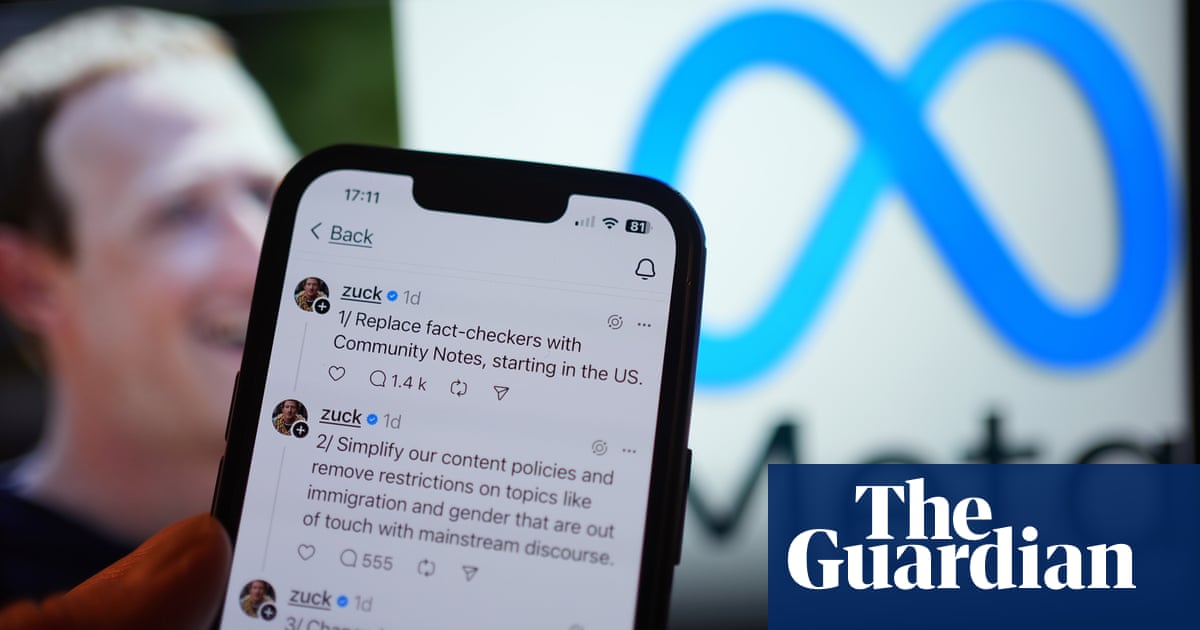Hello, and welcome to TechScape. I’m Blake Montgomery, technology news editor at Guardian US. Today in the newsletter: X’s final form, learnings from a packed week of earnings, and niche online Halloween costumes. Thank you for joining me.
With the US election, X’s transformation into Elon Musk’s weapon reaches its peak. He has succeeded in bending his social network to his will.
Last week, Musk deputized his followers to report any “potential instances of voter fraud and irregularities”, tweeting about and linking to a forum within X called the “election integrity community”. Experts told my colleague Johana Bhuiyan that the community, which has more than 50,000 members, resembled 2020’s Stop the Steal Facebook group with its conspiratorial tenor and morass of uncorrected misinformation.
Users posting on the self-contained feed quickly began pointing out what they deemed evidence of fraud and election interference.
Tweets showing everything from ballots that arrived ripped, an ABC News system test, and a postal worker doing his job and dropping off mail-in ballots were all presented as evidence that the presidential election had been compromised. Among the tweets are attempts at doxing and identifying people who users falsely accuse of ballot-box stuffing or preventing Trump supporters from voting. Before anyone can determine whether the claims are true or false, users seize on the posts and assume the often unsuspecting person being shown is guilty.
Musk is weaponizing X’s features. He’s bending the posts of others to his political will, curating the discussion into an alternative reality. He’s favoring the posts of some while hiding those of others: the Washington Post reported last week that, of the 100 top-tweeting congressional accounts, only Republicans are going viral. When he first bought Twitter, Musk deployed Twitter’s internal documents to reshape its public image with the Twitter Files. Then, when he endorsed Donald Trump, he made his own account his spear. He bombarded his followers with pro-Trump messages and a glitchy Trump interview on Twitter Spaces.
We’ve never seen a transformation like X’s: a billionaire unafraid of campaigning and naked partisanship bending a connective network used by tens of millions to his vision of reality. Elon Musk was the October surprise.
In the absence of financial success with his forced purchase, Musk has turned to politics to make his $44bn bet pay off. As my colleague Dan Milmo put it: “X’s continued influence as a news source and its role as an outlet for broadcasting its owner’s rightwing views to his 200 million-plus followers, means the benefit to the world’s richest person does not need to be measured in financial benchmarks alone.” Think of the restoration of Trump’s account and all Musk’s pro-Trump tweets as in-kind contributions, which Musk will cash in on during a Trump presidency.
When the election ends – will it ever end? – X’s value will decrease. It will become less important that the world’s richest man is yammering about voter fraud conspiracies. X’s traffic will probably fall off, as it does for media outlets that see surges of interest in political contests and corresponding craters. We will see the effects of Musk’s weaponization in the clear light of day.
Learnings from earnings

Five of the Magnificent Seven – Google, Microsoft, Meta, Amazon and Apple – reported their quarterly earnings last week. All beat Wall Street’s revenue expectations, though not all stocks went up. From their stellar performances, we can glean a few lessons.
1. Ads are still the lifeblood of the internet’s economy
Google earnings, Meta earnings and even Amazon earnings show that digital ads can still sustain an empire.
2. Investment in AI is paying off, particularly for the cloud business
Bully for Google, Microsoft and Amazon! All three, as well as Meta, have increased their capital expenditures by tens of billions to pay for their artificial intelligence products, but investors seem to think it’s worth it. Each reported strong growth in its cloud business. Meta’s investment in open-source AI has likewise led it to claim the title of Most Used AI as it inserts Meta AI into Facebook, WhatsApp and Instagram. Investors loved that.
3. Both of these upshots benefit one company in particular
Reddit, which turned a profit for the first time as a public company last week, saw a whopping 68% revenue increase compared with the same quarter last year. The company makes most of its money from advertising, so a robust market means Reddit earns more money even as a smaller player than Google and Meta. Reddit’s ad revenue is up 56%.
Reddit chief Steve Huffman also attributed the company’s above-expected performance to a newer revenue stream: deals with AI companies. Everybody who wants to build a large language model that generates English text uses Reddit to train that AI. That social network is a vast and well-organized corpus of text written by human beings. Reddit licenses that dataset to Google, OpenAI and others for tens of millions of dollars. That source of cash might not last for ever, but it’s not going away any time soon.
Reddit, in turn, is benefiting from AI. Monthly users of the social network rose by half in this quarter alone to an astounding 97 million. Huffman attributed the dramatic rise to the social network’s new translation feature, which uses AI to rewrite English posts in French, Spanish, Portuguese, Italian and German. The company plans to expand the feature in the coming months.
after newsletter promotion
New York magazine’s John Herrman points out that Reddit, as a repository of human-written material, is also the beneficiary of people who want to be sure what they’re reading was not written by AI. As such, Reddit has become “Google’s favorite website”, Herrman writes, a throne that comes with its own sword of Damocles. Huffman said Reddit had become Google’s sixth-most searched word. Many digital media outlets have reached the same lofty place only to fall back to earth with a crash.
This week on my iPhone

Niche Halloween costumes got the meme treatment with the proliferation of jokes beginning with “I hate gay Halloween … ” on X and Instagram. The meme seems to point to something greater: online culture has reached a point of not only debating the appeal of an individual specific reference – NeNe Leakes and a white refrigerator, for instance – but also arguing about the worthiness of taking the internet’s inside jokes IRL. Is it worth wearing a bulky cardboard box all night as you yell: “It’s from an early season of The Real Housewives!”? There’s a bit of self-loathing involved in starting your own tweet of your costume with “I hate”. I predict next year we’ll see more witches and cats.
Perhaps not, though. A rebuttal from X in the name of joy: “i love everybody’s niche halloween costumes!! i love the specificity I love the creativity i love when you put a lot of time and effort into something that is quite literally just to make yourself laugh and i genuinely love when i don’t understand it and have to have it explained.”
For my part, I dressed as a skeleton for the third year in a row.
The wider Techscape

-
“I am the infamous non-responder in our group chat” – does that make someone a bad friend?
-
Meta and Amazon’s ambitions to expand their data center operations with nuclear power hit roadblocks this week. Meta was foiled by rare bees, Amazon by a standard unfavorable commission vote.
-
OpenAI launched ChatGPT search.
-
How to: is your smartphone being tracked? Here’s how to tell.
-
And is your air fryer spying on you? The everyday items that are stuffed with trackers.
-
Lol: Russia fined YouTube $20 decillion, more than the gross domestic product of the entire world.

.png) 2 months ago
15
2 months ago
15













































